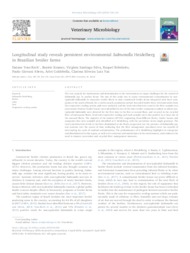Longitudinal study reveals persistent environmental Salmonella Heidelberg in Brazilian broiler farms.
Longitudinal study reveals persistent environmental Salmonella Heidelberg in Brazilian broiler farms.
Summary: Abstract: The vast capacity for maintenance and dissemination in the environment are major challenges for the control of Salmonella spp. in poultry farms. The aim of this study was to assess environmental contamination by nontyphoidal Salmonella in successive broiler flocks in nine commercial broiler farms integrated with three companies in the south of Brazil, for a twelve-month production period. Recycled broiler litter, feed and swabs from the evaporative cooling system pads were analyzed, and the total enterobacteria count in the litter samples was ascertained. Positive broiler houses were identified in two of the three broiler companies studied, in which nontyphoidal Salmonella were detected for the first time in the first or second flock, and recurred in the recycled litter of subsequent flocks. Feed and evaporative cooling pad swab samples were also positive in at least one of the assessed flocks. The majority of the isolates (87.5%) originating from different flocks, broiler houses and companies that were sampled were identified as S. Heidelberg, with the prevalence of one single genotype. The total enterobacteria levels in the litter diminished as the flocks progressed, but the presence of Salmonella spp. was constant over the course of time, indicating that the litter management procedures were not capable of interrupting the cycle of residual contamination. The predominance of S. Heidelberg highlights its emergence and dissemination in this region, as well as its resistance and maintenance in the environment, and reinforces the need to improve prevention and recycled litter management measures.
Publication year: 2019
Types of publication: Journal article
Unit: Embrapa Swine & Poultry
Observation
Some of Embrapa's publications are published as ePub files. To read them, use or download one of the following free software options to your computer or mobile device. Android: Google Play Books; IOS: iBooks; Windows and Linux: Calibre.
Access other publications
Access the Agricultural Research Database (BDPA) to consult Embrapa's full library collection and records.
Visit Embrapa Bookstore to purchase books and other publications sold by Embrapa.

